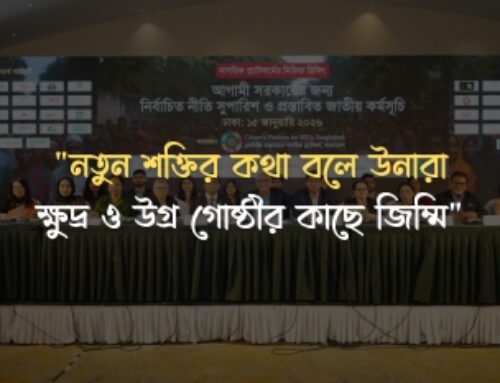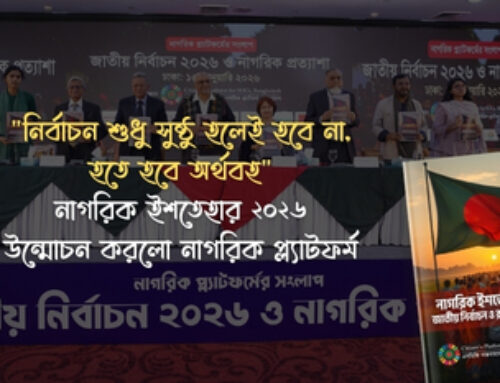From the perspective of Leave No One Behind (LNOB), three major concerns for FY 2021-22 have remained. The three challenges are in ensuring vaccination for all, taking the fiscal stimulus packages to them and keeping the food price inflation in control. To tackle these challenges an expansion of the fiscal transfer and food support, and ensuring their proper delivery by upgrading the database and engaging the community-based (non-government) actors; bringing the people of disadvantaged communities under a national vaccination programme on a priority basis in partnership with the private development organisations and public bodies working with them; keeping the food prices (inflation) low and stable by strengthening public procurement mechanism, Open Market Sales (OMS) operation and expanding Food for Work (FFW) programmes; and pro-LNOB participation for post-COVID-19 recovery – particularly for mopping up drop-outs, averting underage marriages, and preventing child labour.
These observations were shared at the virtual media briefing titled National Budget for 2021-22: How will the “disadvantaged people” be benefited. The virtual event was organised by the Citizen’s Platform for SDGs, Bangladesh on Sunday, 8 August 2021.

Dr Debapriya Bhattacharya, Convener, Citizen’s Platform for SDGs, Bangladesh and Distinguished Fellow, Centre for Policy Dialogue (CPD) made the keynote presentation at the virtual event. He presented that according to the National Board of Revenue (NBR), Bangladesh revenue collection increased by 23% in FY21 compared to FY20. Duty at import and export level has contributed the most to the increase. Income tax collection was impressive. Growth of QIIP medium and large-scaled industries showed signs of recovery in FY21 compared to FY20. However, the growth has been uneven, disfavoring the small enterprises (till July-April FY21). Export growth was modestly positive – 15. 1%, non-RMG exports were also appreciable 27.5%. Remittance income flow was very robust – 36.1%. The overall growth of import payment from – 8.6% in FY20 to 19.7% in FY21 has been impressive, driven by huge imports of rice, petroleum and fertilizer. However, whether the growth in import payment has been due to price effect or volume effect would require clarification.
He also shared that private investment as a share of GDP has decreased to 21.25% which is the lowest in the last 5 years. Public investment on the other hand has increased, but the ADP implementation figure is at variance (58% in 11 months). Public expenditure implementation rate has been noticeably low for net food operation up to April FY21 compared to the corresponding period of the previous fiscal year. Fiscal deficit still remains lower than programmed. However, the dominant source of financing the deficit has swapped places between FY20 and FY21 – from bank borrowing to National Savings Certificate (NSC), leading to higher debt servicing liability. The momentum of foreign financing has slowed down in the last quarter of FY21.
The Core Group Members of the Citizen’s Platform also spoke at the event. The session was chaired by Advocate Sultana Kamal, Former Executive Director, Ain o Salish Kendra. She stated how the budget intended to focus on the left behind people. Unfortunately, the reflection of it is yet to be seen. Although there are strides in remittances and investments, the left behind communities are still ignored in the budget.
CPD’s Distinguished Fellow, Professor Mustafizur Rahman stated that the pattern in the growth rate is indicative of inequality towards the left behind people. He urged for increased OMS activities across the country considering the rising pressure on the people due to food price inflation. Speaking of the sustainability of remittance growth, he stated that it may not have a growth similar to recent times.
Dr Iftekharuzzaman, Executive Director, Transparency International Bangladesh (TIB), said that it is important to allocate resources but it is also important to ensure transparency and accountability in effectively using these resources. It is uncertain how this budget will help the left behind people.
Executive Director of the Manusher Jonno Foundation, Ms Shaheen Anam expressed that the budget did not put sufficient importance on women and children. There is a lack of planning to address child labor. There is yet to be any planning or budget allocation to help these children.
Dr Mushtaque Raza Chowdhury, Former Vice Chairperson, BRAC stated that the left behind people are still deprived in the vaccination process. We need to be proactive to include those left behind in the system. He suggested the following short-term strategies: increase COVID-19 testing rate, educate the mass about the proper way of wearing masks, vaccinate the mass, and open schools once the transmission rate is low. He also suggested creating a committee that will focus on the conception and implementation of a road map with global health guidelines.
Ms Rasheda K Choudhury, Executive Director, Campaign for Popular Education (CAMPE) stated that it was anticipated that this budget would be pro-poor especially towards the left behind communities, but it was mislaid. There is always a discrepancy in household data and administrative data. Importance should be given on vaccination of teachers and proper guidelines on school safety.
Initially SMEs did not benefit from the stimulus packages, however the latest stimulus package is supposed to include those SME businesses who did not benefit the first time informed Mr Asif Ibrahim, Vice-Chairman, New Age Group and Industries. The continuous lockdown has severely hit the SME sector. He also stated that rules and regulations should be easier for new entrepreneurs.
Ms Anisatul Fatema Yusuf, the Coordinator of the Citizen’s Platform gave the welcome remarks at the session. The media briefing ended with a Q&A session with the journalists.




